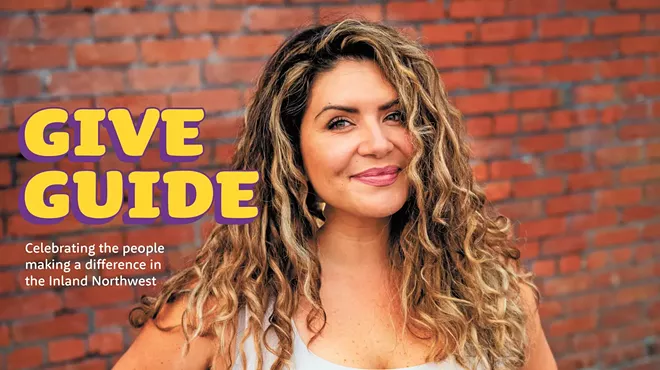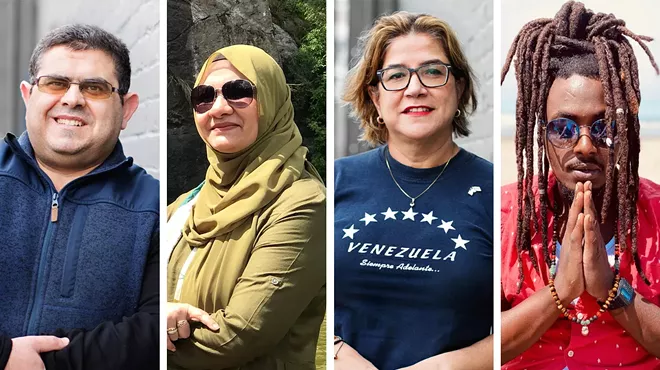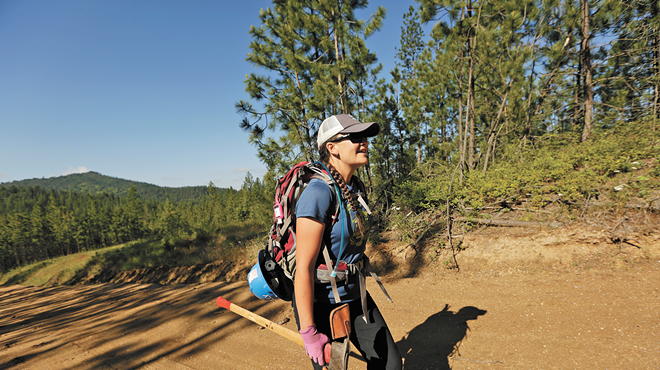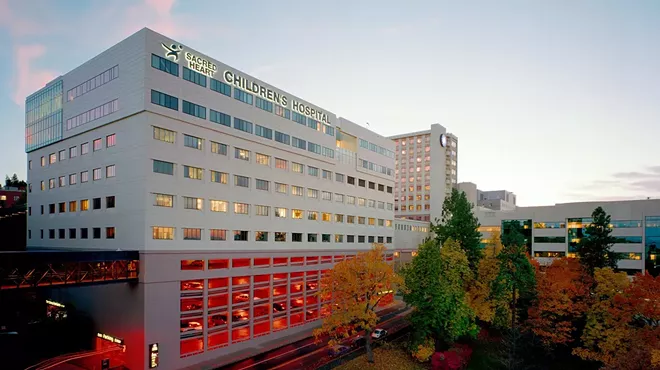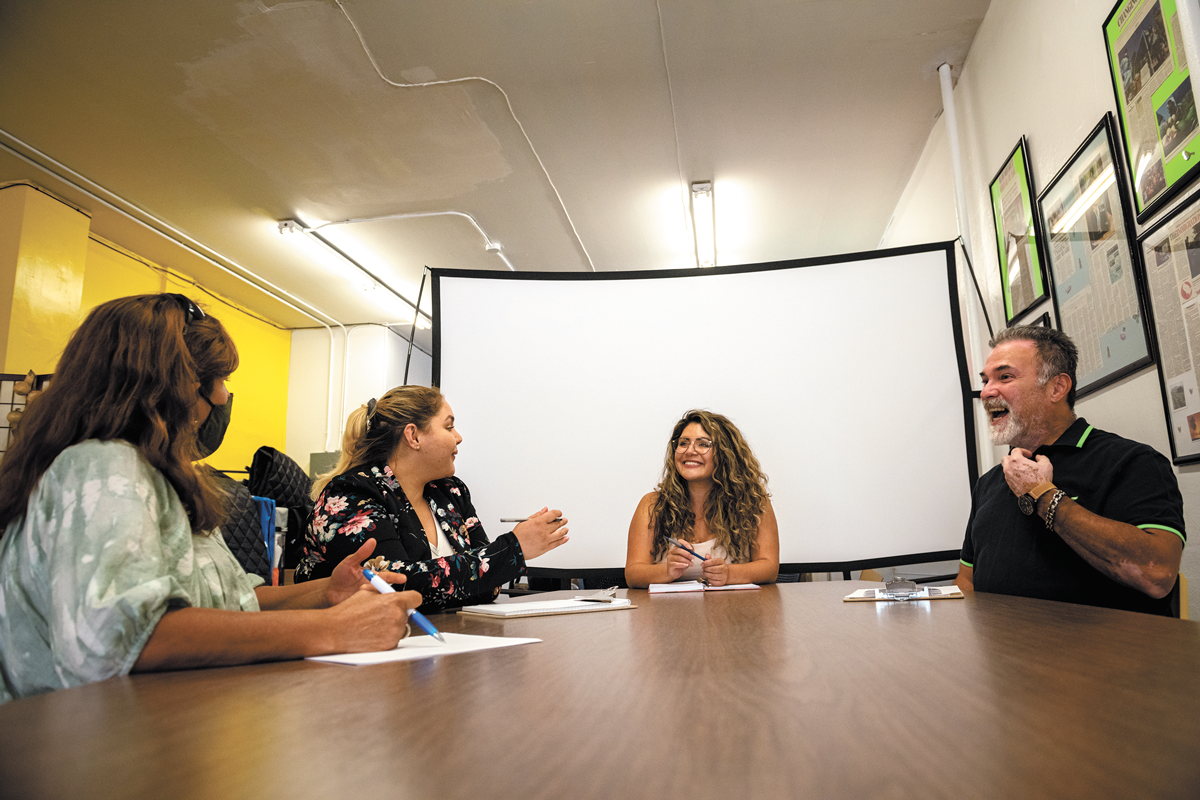
There are moments where it feels like the mission of Latinos En Spokane is everything and everywhere.
It's about translation and immigration information and food distribution and housing assistance and legal advice and COVID testing and political activism and cultural connection.
They put on farmers markets and vaccination clinics. When Border Patrol interrogates passengers at Spokane's downtown Greyhound bus depot, Latinos en Spokane passes out Know Your Rights cards.
When a Latino farmworker caught COVID-19 and his employer, Washington Fruit and Produce, refused to pay for his medical bills, Latinos en Spokane intervened. They contacted journalists who told his story. They scraped together money for a hotel, a wheelchair and a ticket home.
When a multigenerational Latino family, living in a small mobile home in Spokane Valley, came down with COVID, Latinos En Spokane showed up at their door offering anything they needed help with.
"They couldn't believe that it was just free," says Jennyfer Mesa, co-founder of Latinos En Spokane. "They couldn't believe that this existed, where they could get support with rent and food. ... It's been a beautiful experience."
Even as we sit in the Latinos En Spokane offices on Monroe on a Wednesday evening, we have to move to the tables in the back, as a small troupe of attorneys from the Volunteer Lawyers Project and the Northwest Justice Project flood in.
They're here to help Latino community members navigate the finer points of divorces, parenting plans and evictions.
Navigating the legal system can seem mind-numbing, but Mesa knows firsthand how bureaucracy, identity and community are intertwined. Sharing her story at Pivot, Spokane's nonfiction storytelling show earlier this year, Mesa described how paperwork could be the difference between home and exile.
Born in Colombia, she recalls how her mother guarded a folder filled with identifying information.
"Even at that young age, I knew that folder was sacred," Mesa says, adding that without the documents they contained, "I'd be nameless."
Yet when her family immigrated to Miami, that folder went missing. It was stolen, she believes. Someone had un-documented her, forcing her to continually prove she was who she said she was.
But today, in an era when Spokane's Latino population has been threatened by deportation and disease, she's helping the entire community prove who it is.
Start with a precept, an obvious but overlooked reality: There are Latinos in Spokane.
About one of every 15 residents identifies as Hispanic or Latino, according to the 2020 census. But it doesn't always feel that way.
"There is this invisible presence of the Latino population," Mesa says. For some undocumented immigrants, that invisiblity is a survival technique. If your immigration status could get you deported, Mesa says, you may not feel safe participating in activities in your school, your neighborhood or your community. You may decide to keep your head down, lest you draw the wrong kind of attention.
When Mesa came to Spokane in 2012, she says, there was basically one restaurant or nightclub — Tacos Tumbras — where Latinos in Spokane would congregate.
"We just don't have cultural landscapes," Mesa says.
There wasn't a space for the Latino and Hispanic community to thrive.
"How can we start shifting that?" Mesa was asking herself. "We know the population's here, we're just not connected."
By fall 2017, that disconnectedness felt particularly dangerous. Donald Trump, who had launched his campaign by declaring that Mexico was flooding America with rapist immigrants, was president.
"We wanted to keep the community safe," she says.
Mesa and a few friends launched a private Latinos En Spokane Facebook group as a way to share information between a select group of people.
"We had our little filter process to enter the space. We wanted it to be safe. Safe from Border Patrol, safe from trolls," Mesa says. "Even if we couldn't have a physical space, we wanted to have an online space."
They'd translate news articles into Spanish and post them. Facebook group members would ask questions, and Mesa and others would track down the answers.
Soon, Mesa began to learn where the biggest needs — the most frequently asked questions — were. In early 2018, they held their first workshop, on a budget of just $20 at the Downtown Spokane Library. An expert from the Seattle satellite campus of the National Autonomous University of Mexico trained the attendees on how to become citizenship advocates for the Latino community.
"We had a full house," Mesa says. "We had people from Argentina, Mexico, Venezuela, a person from Japan."
And when the Trump administration announced it would be ending temporary protected status for people from El Salvador, Nicaragua and Venezuela, they launched another workshop.
"Our group grew from like 200 people to over a thousand within the first year," Mesa says.
And all the fears around immigration and the Trump administration also imperiled another vital process: the 2020 census. The census is about counting people, yes, but also about making people count.
"We have been undercounted in the past, and that doesn't help us," Mesa says. "We need to be heard and be knowing that we're here so we can advocate for resources in our community."
With some Latino residents understandably wary about answering questions from the Trump-led federal government, the Washington Census Alliance gave Latinos En Spokane a big grant to help them reach out to the community.
Latinos En Spokane hired trusted messengers who then contacted 30 and 40 families each. They held tamaladas, food festivals featuring tamales from eight different parts of Latin America. They assured undocumented immigrants that the census information they shared wasn't going to get them deported or hurt their immigration efforts.
Ultimately, the census would show that in the last decade, the Latino share of Spokane County's population jumped from 4.5 to 6.6 percent. And all those efforts had an unexpected benefit.
"When COVID hit, we were able to turn to our trusted messengers and say, 'Hey, call your contacts, see how they are doing,'" Mesa says. "It was beautiful."
In the early days of the pandemic, a lot of the most important information wasn't available in Spanish. Latinos En Spokane rushed to translate breaking news and answer questions like "Will the Cheney School District be open tomorrow?" and "Is day care going to be open?'"
They teamed up with the Spokane Immigrant Rights Coalition to launch a GoFundMe that raised $25,000 for families impacted by the pandemic.
Funding from Better Health Together, a local health care nonprofit, allowed Latinos En Spokane to hire more staff and train them to help navigate complicated bureaucracies. When Latino families fell behind on rent, Mesa and the other Latinos En Spokane members helped them find rental assistance.
Early on, a small grant from Innovia Foundation had allowed them to put on drive-thru events to pass out food and masks and even provide COVID-19 tests.
"[But] we were missing that social connection," Mesa says. "It was really hard to just see people with our mask on and have them drive through and open their trunk and just leave."
Enter El Mercadito: An outdoor farmers market featuring fresh produce, booths from local entrepreneurs, and local health care providers offering COVID testing and vaccinations.
"We also dance there," Mesa says, smiling. "We do Zumba."
"He said, 'I haven't felt community or space like this in Spokane, and I've been here for years.'"
In a way it's a celebration. It's a culmination of all of Mesa's ambitions with Latinos En Spokane: creating jobs, helping her community, reshaping the cultural landscape.
"I'm seeing it now," she says. "I'm seeing it take place."
El Mercadito represented a community breaking free of isolation — an isolation deeper than the one imposed by COVID.
She recalls seeing one of the market's young volunteers emotionally overcome by what the market represented.
"He said, 'I haven't felt community or space like this in Spokane, and I've been here for years," Mesa says. "'I loved hearing people speak Spanish, I love serving my community, I love the music.'"
His mask may have hid his smile, but not his tears.
"He said, 'I felt at home and I've never felt that,'" Mesa says.
But he says it, of course, in Spanish: "Me sentí como en casa." ♦



